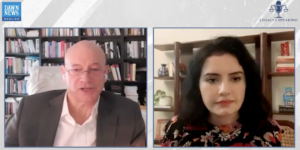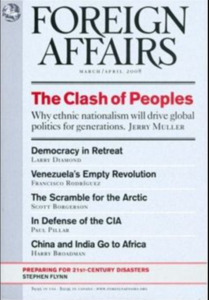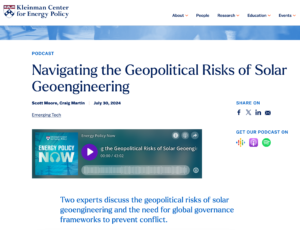 It was a pleasure to discuss in a podcast with Ayesha Malik of Dawn News in Pakistan a range of climate change issues, and in particular the ways in which contributions to climate change, and particular responses to climate change, may contribute to the risks of armed conflict.
It was a pleasure to discuss in a podcast with Ayesha Malik of Dawn News in Pakistan a range of climate change issues, and in particular the ways in which contributions to climate change, and particular responses to climate change, may contribute to the risks of armed conflict.
Geoengineering
Geoengineering Wars and Atmospheric Governance
 Published my latest article, written with Scott Moore of UPenn, “Geoengineering Wars and Atmospheric Governance,” in the The Harvard International Law Journal. A copy can be downloaded from SSRN here. Here is the abstract:
Published my latest article, written with Scott Moore of UPenn, “Geoengineering Wars and Atmospheric Governance,” in the The Harvard International Law Journal. A copy can be downloaded from SSRN here. Here is the abstract:
The increasingly harsh and unevenly distributed heat-related harms caused by climate change, together with frustration over the collective inability to respond to the crisis, are likely to make unilateral geoengineering efforts increasingly attractive. Stratospheric aerosol injection (“SAI”) is a form of solar radiation modification that is effective, technically feasible, and within the financial means of many states and even non-state actors. Yet, there are virtually no global governance structures in place to specifically regulate such activity, and existing international law would provide only weak constraints on unilateral SAI efforts. These features create incentives for unilateral action in what is known as a “free driver” problem: few constraints on a unilateral action that has low direct cost combined with immediate direct individual benefit despite widely distributed risks and indirect costs.
There would be significant collateral environmental and climatic harms associated with SAI. That, coupled with the high risk of unilateral action, is reason enough for both caution and stronger governance. But another risk posed by any unilateral SAI effort—one that is underappreciated and under-theorized—is that of armed conflict. We explore how and why states would likely perceive the potential risks associated with unilateral SAI effort as constituting a threat to national security, and in the absence of adequate legal and institutional mechanisms to constrain such unilateral action, might well contemplate the use of force to defend against the perceived threat. The Article explores and explains how and why the jus ad bellum regime is unlikely to prevent states from engaging in unauthorized use of force against unilateral SAI actors. (click “read more” below for full abstract).
Foreign Affairs Essay – The Battle Over Blocking the Sun

 My colleague Scott Moore and I published an essay in Foreign Affairs that summarized some of the arguments that we make in our forthcoming law review article in the Harvard International Law Journal. The essay (with a title we did not love) is “The Battle Over Blocking the Sun: Why the World Needs Rules for Solar Geoengineering,” Foreign Affairs, Aug. 14, 2024. The argument is captured in the abstract to our much longer law review article, “Geoengineering Wars and Atmospheric Governance,” Harvard International Law Journal (forthcoming, 2025), which is here:
My colleague Scott Moore and I published an essay in Foreign Affairs that summarized some of the arguments that we make in our forthcoming law review article in the Harvard International Law Journal. The essay (with a title we did not love) is “The Battle Over Blocking the Sun: Why the World Needs Rules for Solar Geoengineering,” Foreign Affairs, Aug. 14, 2024. The argument is captured in the abstract to our much longer law review article, “Geoengineering Wars and Atmospheric Governance,” Harvard International Law Journal (forthcoming, 2025), which is here:
The increasingly harsh and unevenly distributed heat-related harms caused by climate change, together with the frustration over the collective inability to respond to the crisis, are likely to make unilateral geoengineering efforts increasingly attractive. Stratospheric aerosol injection (SAI) is a form of solar radiation modification that is effective, technically feasible, and within the financial means of many states and even non-state actors. Yet there are virtually no global governance structures in place to specifically regulate such activity, and existing international law would provide only weak constraints on unilateral SAI efforts. These features create incentives for unilateral action in what is known as “free driver” problem —few constraints on unilateral action that has low direct cost combined with immediate direct individual benefit and widely distributed risks and indirect costs.
There would be significant collateral environmental and climatic harms associated with SAI. That, coupled with the high risk of unilateral action, is reason enough for both caution and stronger governance. But another risk posed by any unilateral SAI effort—one that is underappreciated and under-theorized—is that of armed conflict. We explore how and why states would likely perceive the potential risks associated with unilateral SAI effort as constituting a threat to national security, and in the absence of adequate legal and institutional mechanisms to constrain such unilateral action, might well contemplate the use of force to defend against the perceived threat. The article explores and explains how and why the jus ad bellum regime is unlikely to prevent states from engaging in unauthorized use of force against unilateral SAI actors.
Guest on Energy Policy Now! Podcast – Managing the Geopolitical Risks of Solar Geoengineering
 My colleague Scott Moore and I were guests on the Energy Now! Podcast, produced by the University of Pennsylvania’s Kleinman Center for Energy Policy, for an episode entitled “Navigating the Geopolitical Risks of Solar Geoengineering,” to discuss our law review article on this topic forthcoming in the Harvard International Law Journal, and shorter essay on the subject in Foreign Affairs.
My colleague Scott Moore and I were guests on the Energy Now! Podcast, produced by the University of Pennsylvania’s Kleinman Center for Energy Policy, for an episode entitled “Navigating the Geopolitical Risks of Solar Geoengineering,” to discuss our law review article on this topic forthcoming in the Harvard International Law Journal, and shorter essay on the subject in Foreign Affairs.
